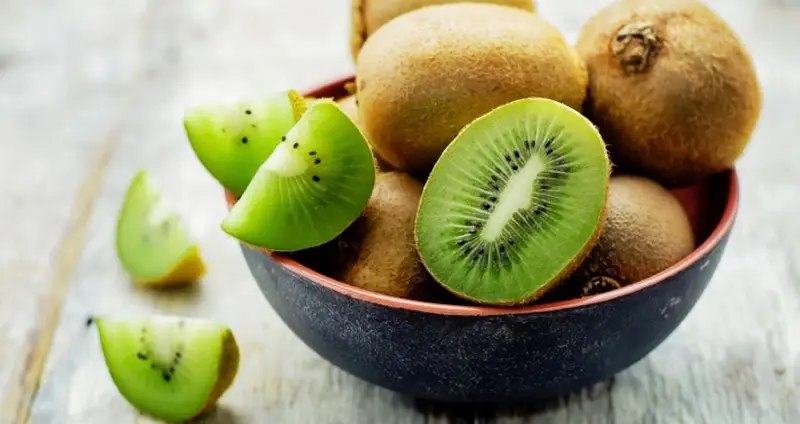
Kiwi, a vibrant green fruit with a sweet-tangy taste, is packed with essential nutrients and antioxidants. Originally from China, it gained global popularity after being renamed in New Zealand in the 20th century, inspired by the local kiwi bird. Today, kiwi is widely consumed in Australia, Europe, and beyond, thanks to its numerous health benefits.
Kiwi’s Nutritional Profile
Kiwi is a low-calorie, nutrient-dense fruit. A large kiwi contains approximately:
– 60 calories
– 13g of carbohydrates (including 3g of fiber)
– 1g of protein
– 0.5g of fat
In terms of micronutrients, kiwi is exceptionally rich in:
Vitamin C – Over 100% of the daily requirement
Vitamin K – 50% of the daily requirement
Potassium – 10% DV
Vitamin E – 8% DV
Copper & Folate (Vitamin B9) – 6% DV
Additionally, kiwi contains vitamin A, magnesium, calcium, iron, and a range of antioxidants like lutein, zeaxanthin, beta carotene, and polyphenols.
1. A Powerful Source of Antioxidants
Kiwi is classified as a superfood because of its rich antioxidant composition. Antioxidants play a key role in neutralizing free radicals, which cause oxidative stress and contribute to chronic inflammation—a leading factor in heart disease, cancer, and aging.
Kiwi contains:
– Lutein, Zeaxanthin, and Beta Carotene – Protects cells from oxidative damage
– Vitamin C, E, and A – Strengthens immune function & skin health
– Polyphenols – Reduces inflammation and boosts immunity
Studies show that regular kiwi consumption can help lower inflammation markers, making it a great choice for overall wellness.
2. Supports Eye and Skin Health
Kiwi is one of the best fruits for eye and skin health, thanks to its high levels of lutein, zeaxanthin, and vitamin A.
👁 Better Vision & Eye Protection
– Lutein and zeaxanthin are linked to the prevention of macular degeneration—the leading cause of vision loss in older adults.
– They also protect against UV radiation and reduce oxidative damage to the eyes.
🌿 Glowing, Healthy Skin
– Kiwi is one of the richest sources of vitamin C, which boosts collagen production—essential for firm, youthful skin.
– Studies suggest that kiwi polysaccharides can double collagen production, helping to prevent wrinkles and sagging skin.
3. Boosts Heart Health
Kiwi is excellent for cardiovascular health due to its fiber, antioxidants, and essential nutrients.
❤️ How Kiwi Supports Heart Health:
Lowers Cholesterol – Antioxidants & fiber reduce bad cholesterol (LDL)
Regulates Blood Pressure – Potassium and magnesium help relax blood vessels
Prevents Blood Clots – Vitamin K aids proper blood clotting
Improves Circulation – Reduces inflammation and fat accumulation in the blood
📊 Studies show: People who regularly eat kiwi have 15% lower fat levels in their blood, reducing the risk of heart disease and stroke.
4. Strengthens Immunity & Improves Lung Health
💪 Vitamin C powerhouse
Kiwi outperforms citrus fruits as an immune booster. Vitamin C increases white blood cell production, helping the body fight infections faster.
🫁 Eases Respiratory Issues
Studies suggest kiwi can help alleviate asthma symptoms, especially in children.
Vitamin C and antioxidants reduce airway inflammation, making breathing easier.
Final Thoughts: Why You Should Eat More Kiwi
Kiwi is a nutritional powerhouse that offers numerous health benefits, including:
Stronger immunity
Healthier skin and eyes
Better heart function
Reduced inflammation
Improved digestion & lung health
With its sweet, tangy flavor and refreshing texture, kiwi is a delicious way to boost overall health. Whether eaten raw, in smoothies, salads, or desserts, this superfruit deserves a spot in your daily diet!



